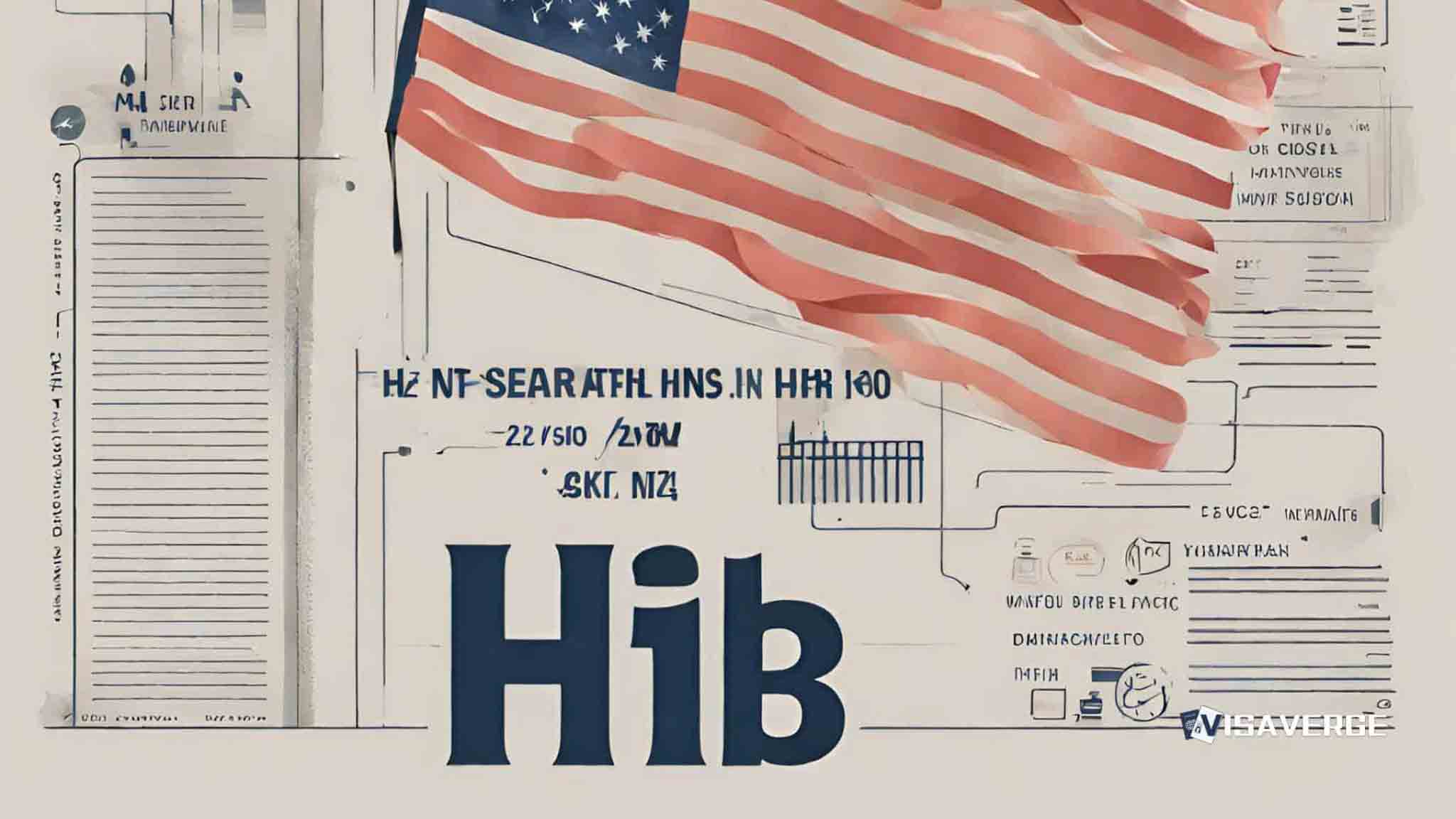Key Takeaways
• On June 25, 2025, Honduras and the U.S. signed agreements on biometric data sharing and migrant protection.
• 20,000 H-2B visas reserved for Hondurans with petitions due by September 15, 2025.
• TPS extended through July 5, 2025; new voluntary deportation program offers $1,000 incentives to returnees.
The purpose of this analysis is to provide a clear, detailed overview of the recent changes and ongoing developments in immigration policy and cooperation between Honduras 🇭🇳 and the United States 🇺🇸. This report focuses on the outcomes of the June 25, 2025, high-level meeting between Honduran President Xiomara Castro and U.S. Homeland Security Secretary Kristi Noem, as well as the broader context of migration, security, and bilateral relations. The scope includes the agreements signed, policy shifts, practical effects for migrants and employers, and the future outlook for both countries.
Methodology

This analysis draws on official statements, government data, and recent news reports to present an objective summary of key developments. Quantitative data such as visa allocations and deportation figures are included, along with step-by-step procedures for affected groups. The report also integrates perspectives from both Honduran and U.S. officials, as well as independent analysts, to provide a balanced view. Visual descriptions and summary tables are used to help readers understand trends and patterns.
Key Findings Upfront
- Renewed Dialogue: President Xiomara Castro and Secretary Kristi Noem have restarted high-level talks after a period of tension, signaling a possible shift in U.S.-Honduras relations.
- Agreements Signed: The two governments signed a letter of intent to negotiate biometric data sharing and an agreement on migrant protection in Honduras, though details remain limited.
- Visa Opportunities: For fiscal year 2025, 20,000 H-2B visas are set aside for Hondurans and nationals of six other countries, with a deadline of September 15, 2025.
- Deportation Policy: The U.S. has begun a new “voluntary deportation” program, offering incentives for migrants to return to their home countries.
- Temporary Protected Status (TPS): TPS for Hondurans in the U.S. has been extended through July 5, 2025, with a re-registration period currently open.
- Military and Security Cooperation: The restoration of the extradition treaty and ongoing talks about military cooperation at Soto Cano Air Base reflect a thaw in relations, but skepticism remains.
Data Presentation and Visual Descriptions
Timeline of Key Events
Imagine a horizontal timeline with four main points:
- June 25, 2025: High-level meeting in Tegucigalpa between President Xiomara Castro and Secretary Kristi Noem. Agreements on biometric data and migrant protection are signed.
- May 19, 2025: First voluntary deportation flight from the U.S. returns 38 Hondurans and 30 Colombians, each receiving a $1,000 debit card.
- Fiscal Year 2025: 20,000 H-2B visas reserved for Hondurans and others, with petitions due by September 15, 2025.
- July 5, 2025: Deadline for Hondurans in the U.S. to re-register for TPS.
Summary Table: Key Recent Developments
| Date | Event/Development | Details |
|---|---|---|
| June 25, 2025 | High-level U.S.-Honduras meeting | Castro and Noem discuss migration, security; sign biometric data and migrant protection letters |
| May 19, 2025 | First voluntary deportation flight | 38 Hondurans, 30 Colombians returned; $1,000 incentive; streamlined process |
| FY 2025 | H-2B visa expansion | 20,000 visas reserved for Hondurans and others; petitions due by Sept. 15, 2025 |
| July 5, 2025 | TPS re-registration deadline for Hondurans | Ongoing protection for eligible Hondurans in the U.S. |
Comparisons, Trends, and Patterns
Shifting Bilateral Relations
Under President Trump, U.S.-Honduras relations were tense. President Xiomara Castro suspended the extradition treaty in 2024 and threatened to end military cooperation at Soto Cano Air Base if mass deportations resumed. However, in early 2025, Castro restored the extradition treaty and softened her stance on military cooperation, opening the door for renewed dialogue.
The June 25, 2025, meeting between Castro and Kristi Noem marks a notable change. Both sides are now focusing on cooperation in migration management, security, and data sharing. This shift is part of a broader U.S. effort to work with regional partners, as seen in Secretary Noem’s meetings with Costa Rican President Rodrigo Chaves and Guatemalan President Bernardo Arévalo.
Policy Changes and Their Effects
- Biometric Data Sharing: Honduras and the U.S. are moving toward a formal agreement to share biometric data on migrants. This aligns with similar U.S. agreements in the region and is expected to make it easier for both countries to identify and track people moving through Honduras.
- Migration Protection Agreement: An agreement was signed concerning migrants seeking protection in Honduras, but details have not been made public. This could mean more migrants are required to seek asylum in Honduras rather than continuing to the U.S., similar to past Asylum Cooperative Agreements.
- Visa Opportunities: The U.S. has expanded the H-2B visa program, reserving 20,000 spots for Hondurans and others. This move is designed to offer legal pathways for work and reduce irregular migration.
- Voluntary Deportation Program: The U.S. has started a new program offering $1,000 debit cards and a streamlined process for migrants who agree to return home. While this is meant to encourage voluntary returns, it is expected to appeal to only a small group.
Evidence-Based Conclusions
For Migrants
- Increased Scrutiny: With biometric data sharing, migrants passing through Honduras will face more checks and tracking. This could make it harder for some to reach the U.S. or claim asylum there.
- Protection in Honduras: The new agreement may require more migrants to seek asylum in Honduras instead of the U.S., echoing earlier policies that shifted responsibility to transit countries.
- Voluntary Return Incentives: The voluntary deportation program offers financial incentives and a possible path to future legal entry, but participation is likely to remain limited.
For U.S. Employers
- More Workers Available: The expanded H-2B visa allocation means U.S. businesses, especially those facing labor shortages, have more opportunities to hire Honduran workers. Employers must file petitions by September 15, 2025, to take advantage of this program.
For Bilateral Relations
- Improved Cooperation: The restoration of the extradition treaty and renewed security talks suggest a warming of relations. However, some analysts and Honduran officials remain cautious, questioning whether these changes are deep or mostly for show.
Step-by-Step Procedures
For Hondurans Seeking TPS Re-registration
- File Form I-821 (Application for Temporary Protected Status) online. Access Form I-821 here.
- If seeking work authorization, file Form I-765 (Application for Employment Authorization) at the same time. Access Form I-765 here.
- Re-register between November 6, 2023, and July 5, 2025. Missing the deadline may result in loss of TPS protection.
For Employers Seeking H-2B Visas for Honduran Nationals
- File petitions at the Texas Service Center by September 15, 2025.
- For the 20,000 country-specific visas, no returning worker requirement applies. This means even first-time applicants are eligible.
For Voluntary Deportation
- Apply via the CBP Home app.
- Approval and flight arrangements are typically processed within three days.
- Upon return, each deportee receives a $1,000 debit card and may apply for future legal entry.
Limitations
- Lack of Transparency: Details of the migrant protection agreement remain undisclosed, making it hard to assess its full impact.
- Rapid Policy Shifts: The quick change from confrontation to cooperation raises questions about the stability and depth of the new agreements.
- Analyst Skepticism: Some experts doubt whether the recent agreements represent real change or are mainly for diplomatic appearances.
- Limited Data: The voluntary deportation program is new, and there is little data on its effectiveness or long-term outcomes.
Background Context and Historical Development
Relations between Honduras 🇭🇳 and the United States 🇺🇸 have been shaped by migration, security, and military cooperation for decades. The U.S. has maintained a presence at Soto Cano Air Base since 1983, using it for humanitarian and anti-drug missions. In 2019, the two countries signed an Asylum Cooperative Agreement, requiring certain migrants to seek protection in Honduras rather than the U.S.
Tensions increased under President Trump, especially after President Xiomara Castro suspended the extradition treaty in 2024 and threatened to end military cooperation in response to U.S. deportation policies. However, in 2025, Castro restored the treaty and resumed talks, leading to the recent agreements.
Multiple Perspectives
Honduran Perspective
Some Honduran officials and analysts question whether the new agreements reflect real change or are mostly for diplomatic optics. They point to the history of tension and the fact that Honduras was previously excluded from high-level U.S. regional visits. Hector Zelaya, Honduran Presidential Minister, has emphasized the strength of U.S.-Honduras relations after the recent meeting, but skepticism remains.
U.S. Perspective
The Trump administration, represented by Secretary Kristi Noem, continues to focus on border security, data sharing, and regional migration management. The U.S. is using both incentives (such as visas and aid) and deterrents (like deportations and threats to military cooperation) to shape migration flows.
Analyst View
Experts remain cautious, noting the rapid shift from confrontation to apparent cordiality. They highlight the lack of transparency around the new agreements and question whether the changes will last. As reported by VisaVerge.com, while the agreements suggest improved relations, the real test will be in their implementation and impact on migrants.
Future Outlook and Pending Changes
- Biometric Data Agreement: The details are still being negotiated and are expected to be finalized in the coming months.
- Migration Policy: The U.S. may expand the voluntary deportation program and continue to push for regional migration management, possibly increasing the number of migrants required to seek protection in Honduras or other transit countries.
- Bilateral Relations: While current signals point to improved cooperation, the relationship remains fragile and could change with political developments in either country.
Official Resources and Contact Information
For more information on TPS, H-2B visas, and other immigration matters, visit the U.S. Citizenship and Immigration Services (USCIS) website. This site provides official forms, deadlines, and detailed instructions for applicants and employers.
For updates on migration agreements and enforcement actions, consult the U.S. Department of Homeland Security (DHS) website. The Honduran Ministry of Foreign Affairs also offers information on bilateral agreements and migration policy.
Actionable Takeaways
- Hondurans in the U.S. should re-register for TPS before July 5, 2025, to maintain their protection.
- U.S. employers interested in hiring Honduran workers through the H-2B visa program must file petitions by September 15, 2025.
- Migrants considering voluntary return should review the new program’s incentives and application process.
- Both migrants and employers should monitor official government websites for updates on pending agreements and policy changes.
Conclusion
The recent meeting between President Xiomara Castro and Secretary Kristi Noem marks a new phase in U.S.-Honduras immigration and security cooperation. While agreements on biometric data sharing and migrant protection have been signed, many details remain unclear. The expansion of H-2B visas and the launch of the voluntary deportation program offer new options for migrants and employers, but their long-term impact is uncertain.
Ongoing skepticism among analysts and some officials suggests that while the tone of the relationship has improved, the substance may still be in question. As both countries move forward, the practical effects of these policies will become clearer, especially for migrants seeking protection or work opportunities and for employers relying on foreign labor.
For the most up-to-date information and official guidance, always refer to trusted government sources such as the USCIS website.
Learn Today
H-2B Visa → A U.S. nonimmigrant visa allowing temporary non-agricultural workers to be employed legally.
Temporary Protected Status (TPS) → A temporary immigration status providing legal protection and work authorization to eligible foreigners during crises.
Voluntary Deportation Program → A U.S. initiative offering financial incentives for migrants who agree to return to their home countries voluntarily.
Biometric Data Sharing → The exchange of personal physical data, like fingerprints, between countries to identify and track migrants.
Extradition Treaty → A formal agreement between countries to surrender individuals accused or convicted of crimes for legal prosecution.
This Article in a Nutshell
The June 2025 summit between President Castro and Secretary Noem signals renewed U.S.-Honduras cooperation. Key agreements on biometric data and migrant protection, visa expansions, and voluntary deportation programs may reshape migration dynamics and bilateral relations over the coming year.
— By VisaVerge.com













